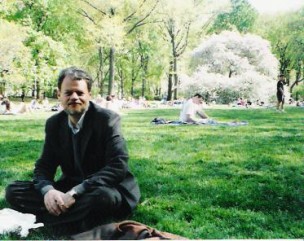
Computer science is often thought of as a field distinct from journalism, but Vice-Chair of Mathematics and Computer Science and Professor of Computer Science James Lipton has crossed the bridge between those two fields and many others. After growing up in Spain and receiving his undergraduate degree from the University of Nebraska, he was Europa Press journalist James Lipton, covering the breakdown of Francisco Franco’s autocratic regime from Spain.
“[It was] sort of like being a journalist in the U.S. in the ’60s,” Lipton said.
However, in the early 1980s, the field of computer science began to take off, and Lipton seized the opportunity to jump on board. He received his master’s degree in computer science and his PhD in mathematics from Cornell University. Since 1993, Lipton has called Wesleyan University his home, teaching and conducting both interdepartmental and international research.
Whether he is collaborating on innovative University projects or working to improve the ease with which coders’ programming ideas become reality, Lipton has dedicated his life to changing the world through the computer. More specifically, Lipton spends his time researching logic programming.
“[Logic programming is] using specifications to create a program,” Lipton said.
Lipton likens logic programming to a recipe. In regular programming, one has ingredients, or specifications. Through cooking, or coding, one creates a dish, or program.
Logic programming is a theoretical field: it requires a series of abstract mathematics and proofs. Lipton finds this work to be particularly stimulating at Wesleyan, since the Computer Science and Mathematics Departments are housed together, making for easy consultation and collaboration. Three of the five computer science faculty members’ work is in the field of logic programming so there is a strong sense of community within the department.
Outside of the department, Lipton is making strides in incorporating computer science methods into music instruction. In conjunction with University Professor of Music and Director of the Electronic Music and Recording Studios Ronald Kuivila’s course, MUSC220: Composing, Performing, and Listening to Experimental, he teaches COMP112: Introduction to Programming, a course open only to students enrolled in both courses. This course pair was last offered in Spring 2014.
“Collaborating with Ron has been, really, a lot of fun,” Lipton remarked.
Computer science is a large part of Lipton’s life, but by no means is it all-encompassing. He has programming and mathematics manuals on his bookshelf, but also a section of volumes on philosophy, art, and poetry.
“Sometimes you need a break [from computer science],” Lipton said.
One such break came in the form of a drawing course he took three years ago, taught by Professor of Art Tula Telfair, whom he describes as brilliant. His interest in art spans a long range of time and genres, from his teenage obsession with surrealism and the Dada movement to his appreciation for American and Spanish abstract painting, as well as German expressionism. He takes advantage of Wesleyan’s convenient location by visiting museums in New York, Boston, and New Haven.
In addition to contributing to various University departments, Lipton has collaborated on computer science research at major European universities, including the University of Pisa, University of Nancy, and the Technical University of Madrid. He spent a semester at Cambridge University during a year-long initiative in programming languages.
This semester, Lipton teaches two courses: a First Year Seminar titled COMP131: Can Machines Think? (Logic and Computation), and a 300-level course, COMP360: Special Topics in Computer Science. He finds that strong classroom discussions can translate into ideas for his research by encountering previously unexamined points of view. Lipton relishes the reciprocal relationship between teaching and research.
“It’s an intellectual feast to be at Wesleyan,” Lipton said.



Leave a Reply